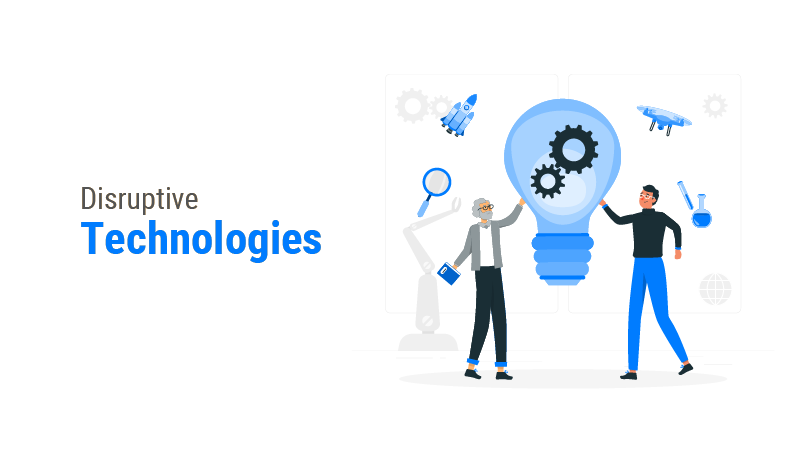Some Examples of Disruptive Technologies

Disruptive technologies are innovations that fundamentally change the way industries operate, often displacing existing products, services, or business models with more efficient, innovative alternatives. Here are some examples of disruptive technologies:
Smartphones: The introduction of smartphones revolutionized communication, entertainment, and computing by combining mobile phone functionality with internet access, multimedia capabilities, and app ecosystems. Smartphones disrupted traditional industries such as telecommunications, photography, navigation, and personal computing, leading to the decline of feature phones, digital cameras, standalone GPS devices, and desktop computers.
E-commerce: The rise of e-commerce platforms such as Amazon, eBay, and Alibaba disrupted traditional retail models by enabling online shopping, digital payments, and direct-to-consumer sales. E-commerce platforms transformed consumer behavior, supply chain logistics, and retail operations, leading to the decline of brick-and-mortar stores and the rise of digital commerce.
Streaming Services: The emergence of streaming services such as Netflix, Spotify, and YouTube disrupted traditional media distribution models by offering on-demand access to digital content, including movies, TV shows, music, and user-generated videos. Streaming services bypassed traditional broadcast and cable networks, enabling consumers to access content anytime, anywhere, on multiple devices, and leading to cord-cutting and the decline of traditional TV and radio.
Electric Vehicles (EVs): The adoption of electric vehicles (EVs) disrupted the automotive industry by offering environmentally friendly alternatives to traditional gasoline-powered vehicles. EV technology, including battery electric vehicles (BEVs) and plug-in hybrid electric vehicles (PHEVs), reduces reliance on fossil fuels, lowers emissions, and promotes sustainable transportation, challenging the dominance of internal combustion engine vehicles.
Blockchain and Cryptocurrency: The development of blockchain technology and cryptocurrencies such as Bitcoin and Ethereum disrupted traditional financial systems by enabling decentralized, peer-to-peer transactions, and digital currencies. Blockchain technology offers secure, transparent, and immutable record-keeping solutions, disrupting industries such as banking, finance, supply chain, and digital asset management.
Artificial Intelligence (AI): The advancement of artificial intelligence (AI) and machine learning technologies disrupts various industries by automating tasks, optimizing processes, and enabling data-driven decision-making. AI applications, including natural language processing, computer vision, and predictive analytics, revolutionize industries such as healthcare, finance, manufacturing, and customer service, transforming business operations and customer experiences.
3D Printing: The development of 3D printing technology disrupts traditional manufacturing processes by enabling on-demand, customizable production of prototypes, parts, and products. 3D printing technology offers cost-effective, flexible, and decentralized manufacturing solutions, challenging conventional mass production methods and supply chain logistics.
Sharing Economy: The emergence of sharing economy platforms such as Uber, Airbnb, and TaskRabbit disrupts traditional industries by facilitating peer-to-peer sharing of resources, services, and experiences. Sharing economy platforms enable individuals to monetize underutilized assets, such as vehicles, accommodations, and skills, challenging traditional business models and regulatory frameworks.
Renewable Energy: The adoption of renewable energy technologies such as solar, wind, and hydroelectric power disrupts traditional energy systems by offering clean, sustainable alternatives to fossil fuels. Renewable energy technologies reduce greenhouse gas emissions, promote energy independence, and decentralize power generation, challenging the dominance of traditional fossil fuel-based energy sources.
Biotechnology and Gene Editing: The advancement of biotechnology and gene editing technologies disrupts healthcare, agriculture, and environmental conservation by enabling precision medicine, genetic engineering, and biomanufacturing. Biotechnology innovations, including CRISPR gene editing, synthetic biology, and gene therapy, offer transformative solutions for treating diseases, enhancing crop yields, and addressing environmental challenges, challenging conventional approaches and ethical considerations.
These examples illustrate how disruptive technologies reshape industries, markets, and societal norms, driving innovation, competition, and societal change in the digital age. Embracing disruptive technologies and adapting to their impacts are essential for businesses, governments, and society to thrive in an era of rapid technological change.
Thank you,